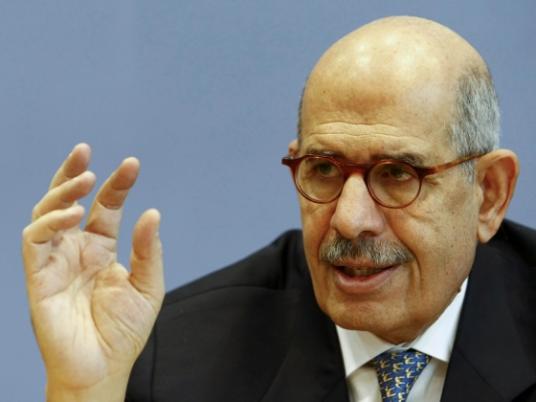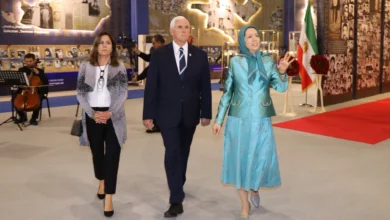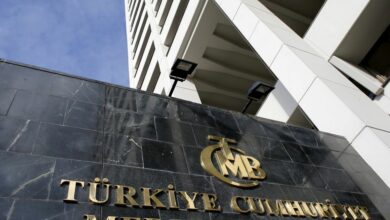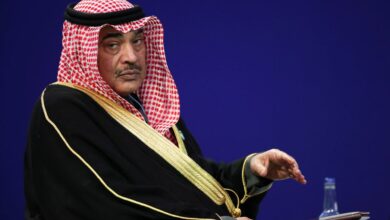Former International Atomic Energy Agency Director Mohamed ElBaradei will meet today with a group of opposition figures to discuss the possibility of drafting amendments to the Constitution to allow independent candidates to run for president in Egypt’s 2011 elections.
The meeting, which is scheduled to take place at 7 PM at ElBaradei’s house will include around 25 opposition figures. George Ishaq, former spokesperson of the pro-change movement Kefaya, Hassan Nafaa, the general coordinator of the Egyptian Campaign against Presidential Inheritance, novelist Alaa Al-Aswany, and Mohamed el-Beltagy, a Muslim Brotherhood MP will all attend.
The participation of Ghad Party founder and former presidential candidate Ayman Nour and Hamdein Sabahy, the leader of the Nasserist Karama Party, both of whom expressed willingness to run for presidency in the coming elections, could not be verified.
The list, which was formed by Ishaq and Nafaa, excluded the heads of Egypt’s oldest secular parties, the liberal Wafd, the leftist Tagamu, and the pan-Arabist Nasserist Party. All three had previously expressed reservations about ElBaradei’s potential nomination.
Participants in the meeting are cautious not to suggest that tangible strategies would emerge from ElBaradei’s house tonight, describing it instead as a “brainstorming session” where different views will be discussed.
“We want to listen to what ElBaradei has in mind,” Ishaq told Al-Masry Al-Youm. “Of course we all agree on the need to change some constitutional articles and guarantees for fair and free elections.”
Last year, ElBaradei announced that he would run for presidency provided certain conditions are met first. He clearly stipulated the need to change Articles 76, 77, and 88 of the Egyptian Constitution, which put hurdles in the way of candidates from parties other than the ruling National Democratic Party.
“The current constitution violates Egypt’s international obligations that everyone should be free to nominate himself (for presidency)," ElBaradei told a popular Egyptian TV show on Sunday.
"The judiciary has an inadequate power as the executive has an excessive power,” he added.
Under the 2007 constitutional amendments, independent candidates are required to collect at least 250 signatures from the parliament and the local councils, which are largely dominated by President Hosni Mubarak’s National Democratic Party.
The amendments also stipulate that candidates should be a leading member for at least one year in a political party that has been in formal existence for at least five years, a condition that effectively bans the 82-year-old Muslim Brotherrhod from running a presidential candidate. The Brotherhood was declared illegal in 1954.
Article 77 of the Constitution allows an incumbent president to run for re-election indefinitely, a situation that the Egyptian opposition say that Mubarak could exploit to run for his sixth term next year.
Egyptian opposition, as well as ElBaradei, have also called for international monitoring of the coming parliamentary and presidential elections in a move to combat fears of a widespread campaign of government-orchestrated electoral fraud.
Local and international rights groups have long complained of government’s electoral fraud, vote rigging, and voter intimidation.
Opposition parties fear that the 2007 constitutional amendment of Article 88, which allowed only for limited judiciary supervision, could further contribute to unfair elections, leading to a landslide victory by Muabarak’s party.
Agreements on general principles could be helpful in bridging the gap between different opposition forces and ElBaradei, who has spent the last 25 years outside of Egypt.
“ElBaradei has indeed contributed to the current political momentum,” said Nafaa, who believes that what is more important is determining the practical steps to achieve political reform. “Our questions would be centered on what ElBaradei can offer to push forward the calls for democratic reform in Egypt,” Nafaa told Al-Masry Al-Youm.
ElBaradei has so far abstained from allying himself with the opposition, which is marred by internal division and lacks a strong grassroots base.
ElBaradei has also shied away from openly criticizing President Mubarak, although he stressed that he “categorically disagree with the president’s policies,” citing Egypt’s poor record in poverty reduction, education, and good governance.
“You should distance yourself from the opposition’s deep internal divisions,” political analyst Amr Hamzawi of the Washington-based Carnegie Endowment for International Peace advised ElBaradei in a recent article.
Hamazawi instead called for the former UN nuclear chief to invest more time and efforts into forging alliances with “reformist elements” in the ruling elites, and establishing him as a true “insider.”
Counting on support from the Muslim Brotherhood, Egypt’s largest and best-organized opposition group, does not appear to be a priority for ElBaradei.
In a recent interview with the popular TV show Cairo Today, ElBaradei acknowledged “the need to establish a political party for the Brotherhood, provided that they abide by the constitution,” an implicit reservation to the group’s positions on women and Christian rights issues.
ElBaradei, who is largely seen as providing a viable alternative to both the regime and the Muslim Brotherhood, has articulated his demands so far along strictly democratic and secular lines.
“Our meeting with ElBaradei today has nothing to do with endorsing him as a possible presidential contender,” said el-Beltagy, a Brotherhood MP who has been acting as the Islamist group’s liason with other opposition forces. “As a group calling for political and constitutional reform, we welcome ElBaradei’s endeavor in this respect.”




